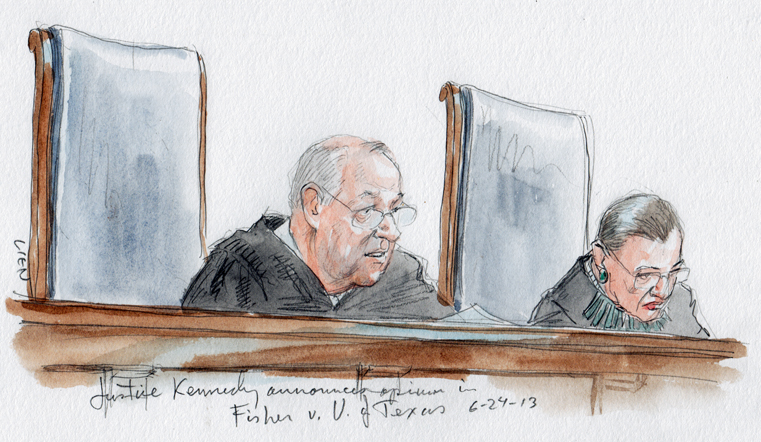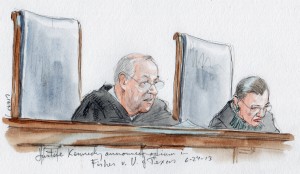Justice Anthony Kennedy’s race jurisprudence
on Jun 29, 2018 at 3:31 pm

Theodore M. Shaw is the Julius L. Chambers Distinguished Professor of Law and Director of the Center for Civil Rights at the University of North Carolina School of Law at Chapel Hill.
Supreme Court Justice Anthony Kennedy’s announced retirement came one day short of the 40th anniversary of Board of Regents of the University of California v. Bakke, in which Justice Lewis Powell wrote an opinion bridging a deeply divided court on whether race could be considered in admissions to selective colleges and universities. In 1978, Powell wrote that under the First Amendment, diversity was a compelling state interest rooted in academic freedom, and that although quotas were unconstitutional, colleges could give limited consideration to race as one factor among many in admissions. Conservatives immediately embarked on a campaign to overturn Bakke, and over time Powell’s place as the “swing vote” in affirmative action/diversity cases was filled by Justice Sandra Day O’Connor, and then by Kennedy. Each, in time, wrestled with the courts’, and the nation’s, enduring dilemma of race. During Kennedy’s time at its center, the court undeniably became more conservative.

Justice Kennedy announces opinion of the court in Fisher v. University of Texas (Fisher I) (Art Lien)
In affirmative action cases, Kennedy, almost without exception, voted to strike down race-conscious measures. In 1989 he joined a narrow majority in City of Richmond, Va. v. J.A. Croson Co., to invalidate a municipal minority contracting plan, but would not vote for an absolute ban on affirmative action programs. In 1995, in Adarand v. Pena, he voted to extend Croson to federal contracting programs.
In 1991 Kennedy joined a five-member majority in Board of Education of Oklahoma City v. Dowell, and in 1992, he wrote the unanimous decision in Freeman v. Pitts, each of which loosened the standard for ending court supervision of formerly de jure segregated school districts. In Missouri v. Jenkins, in 1995, Kennedy joined a 5-4 majority that struck down an extraordinary remedy in the last mandatory school desegregation case decided by the court.
In 2003, in Grutter v. Bollinger and Gratz v. Bollinger, the court revisited affirmative action in higher education. Kennedy joined a 5-4 majority in Gratz that found that the University of Michigan’s undergraduate admissions scheme violated the Constitution because it failed to give applicants individualized consideration and employed a mechanical point system. The law school’s admissions plan was deemed to be Bakke-compliant and was upheld in Grutter. Writing for a 5-4 majority, O’Connor fully embraced Powell’s diversity rationale in Bakke. Kennedy joined Chief Justice William Rehnquist’s dissent, appearing to take his place firmly in the anti-diversity camp.
In 2006 Kennedy concurred in a 5-4 decision in which the court ruled against voluntary desegregation plans in Seattle and Louisville. Kennedy was not hostile to the goal of racially integrated and diverse schools: “That the school districts consider these plans to be necessary should remind us our highest aspirations are yet unfilled.” His problem was not with the goals, but the means. Although he joined the judgment against the school districts, Kennedy did not join Chief Justice John Roberts and Justices Antonin Scalia, Clarence Thomas and Samuel Alito in their strictly narrow application of the 14th Amendment. “The enduring hope is that race should not matter; the reality is that too often it does,” Kennedy wrote, and “parts of the opinion by the chief justice imply an all-too-unyielding insistence that race cannot be a factor in instances when, in my view, it may be taken into account.” The Roberts plurality’s view that “[t]he way to stop discrimination on the basis of race is to stop discriminating on the basis of race” was, for Kennedy, insufficient to resolve the two cases. Thus, he disagreed with the notion that the Constitution required school boards to ignore de facto segregation. While criticizing Justice Stephen Breyer’s dissent for eliding the distinction between de jure and de facto discrimination, Kennedy concluded that “[t]his Nation has a moral and ethical obligation to fulfill its historic commitment to creating an integrated society that ensures equal opportunity for all of its children.” He recognized a compelling interest in avoiding racial isolation of students, and in achieving diversity in student enrollment. What Kennedy insisted the 14th Amendment did not allow was the categorization of individuals by race for disparate treatment.
In redistricting cases, Kennedy joined O’Connor’s 1993 majority opinion in Shaw v. Reno, upholding challenges to majority-minority electoral districts. He wrote the 1995 majority opinion in Miller v. Johnson, a Georgia congressional redistricting case that applied Shaw v. Reno to invalidate a majority-black electoral district stretching from Atlanta to the coast, finding it so bizarrely shaped as to be inexplicable on grounds other than race.
In 2013, in Fisher v. University of Texas (Fisher I), the court considered the constitutionality of the University of Texas’ admissions plan, which was alleged to be inconsistent with Grutter. Kennedy wrote the court’s opinion that vacated the U.S. Court of Appeals for the 5th Circuit’s ruling upholding UT’s admissions scheme, and remanded the case for further consideration under more muscular application of strict scrutiny.
After proceedings on remand, in 2016 Fisher returned to a seven-member court. (As in Fisher I, Justice Elena Kagan did not participate, and the death of Scalia had left a vacancy on the court). In Fisher II, Kennedy wrote for a four-member majority to uphold the lower court’s ruling sustaining the university’s admissions plan. Kennedy found that the diversity rationale was sufficiently supported by evidence that satisfied strict scrutiny, and that the plan was, in fact, narrowly tailored.
Anthony Kennedy was a conservative justice at the center of a conservative court. He voted to strike down almost every affirmative action race-conscious measure before him, with the exception of the UT admissions plan he voted to uphold in Fisher II. He joined rulings against Seattle’s and Louisville’s voluntary elementary and secondary school desegregation plans, even while he refused to declare all race-conscious diversity efforts unconstitutional. He was more likely than not to vote against a race-conscious affirmative action measure but refused to support an absolute ban on affirmative action, always leaving hope that some other measure might survive. Although he recognized that governmental efforts to promote diversity and integration might constitute a compelling interest, he was implacably opposed to racial classifications that affected individuals.
Kennedy’s retirement may open the door to a significant shift in the court’s jurisprudence in race cases as the court becomes even more conservative. If Kennedy is replaced by a justice who shares the less nuanced views of the four remaining conservatives on the court, the 40-year conservative campagn to overturn Bakke may come to completion, and the 14th Amendment will enter another era.


